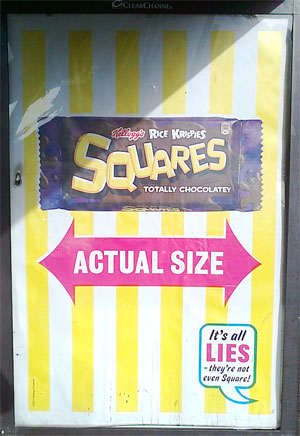It’s all lies
Have you seen the current campaign for Rice Krispies Squares? Both the TV spot and the outdoor posters use the slogan ‘It’s all lies – they’re not even square’ to puncture an outrageous claim or offer – as well as the name of the product itself.
 In the TV ad, the monstrous lie is the promise of a free boat with a purchase, while on the poster it’s the suggestion that the Square is about three feet wide (see image), or that 72,000 flavours are available. There’s also a (rather deserted) Facebook page. The ads were created by Leo Burnett.
In the TV ad, the monstrous lie is the promise of a free boat with a purchase, while on the poster it’s the suggestion that the Square is about three feet wide (see image), or that 72,000 flavours are available. There’s also a (rather deserted) Facebook page. The ads were created by Leo Burnett.
I find the mechanics of this campaign fascinating. If we subject the ‘actual size’ poster to a lite structural analysis, you’ll see what I mean.
The underlying semiotic structure is as follows:
- This is an advert for Rice Krispie Squares.
- A Rice Krispie Square is as big as this poster.
- The claim we just made is false.
- The name of the product is also false.
The semantic algebra is 1+1–1–1=0. Everything added is then taken away, so at the end of the ad, the reader is left holding literally no meaning.
Of course, that’s looking at it in pure linguistic terms. The visual style and tone of voice also contribute.
From the look of the poster, we take away a nostalgia for the bright colours and Monty Python humour of the 1970s.
There’s also a playful metatextual element, as the ad invites us to join it in poking fun at inflated advertising claims and the way they’re hedged about with small print. If the reader buys into that idea, the copy has a ring of truth even as it highlights its own falsehood.
Promise of value
Regular readers will know how fond I am of the phrase ‘promise of value’. I’m always saying how a slogan, or marketing more widely, should promise the reader something they want, need or like.
The most basic interpretation of that is the distinction between product features and customer benefits. But when we get into the outer reaches of B2C branding, the definition of ‘benefit’ becomes very broad – and, crucially, includes the experience of the marketing as well as the product.
The Squares ad promises nothing in terms of sensual enjoyment, economy or anything else tangible we might associate with confectionery. Instead, it associates the brand with a mood or worldview that people might relate or aspire to. The sheer wackiness of the copy implies a sort of irresponsibility or nihilism that young people (I imagine) might enjoy.
Leaving the product behind
This is hardly new territory for B2C – Tango and Pot Noodle spring to mind as brands that have used postmodern self-referentiality and nutty humour.
Yet those campaigns still retained some link, however subtle or anarchic, with the physical experience of consuming the product. With this campaign, Squares has broken free of that completely.
Such an approach could only ever work for ‘fun’ and ‘youth’ brands. Imagine a B2B equivalent:
RGF Infrastructure Solutions. Our solutions don’t solve a thing!
What’s being sold isn’t the answer to a problem. It’s a pure throwaway pleasure that endears itself to its target audience by not taking itself remotely seriously – not even seriously enough to say it’s worth buying.
People’s choice
The campaign has won approval from marketing insiders for its courage in an age where most brands are emphasising social-media truth ‘n’ transparency. But does it really work? Well, I had my doubts, but then I saw this article, where the TV ad won the UTalkMarketing People’s Choice award. Out of a sample of 1000 people, 14% chose it as the ad that would make them want to buy the product or service advertised, putting it ahead of all the other ads (which weren’t named).
Of course, we have to be careful when people state their intentions in surveys. It’s not the same thing as actually parting with cash money for a product. But it’s clear that the campaign did, at the very least, increase the ‘fame’ of the brand with people most likely to buy it. With some audiences, it seems, only lies really ring true.
Tags: It's all lies they're not even square, metatextuality, postmodernism, Rice Krispies, Squares, structuralism